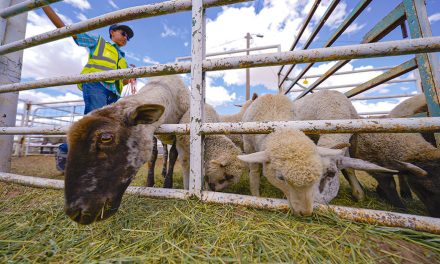
Panel hears updates on water rights cases
GALLUP
Water right cases for the Navajo Nation have been consistently fought in courts for decades.
The Navajo Nation Water Rights Commission had a two-day work session starting on Sept. 16 and ending on Sept. 17. The commission heard updates on settlements and litigations involving water resources in the Navajo Nation.
These presentations and discussions consisted of an update on the Colorado River and Little Colorado River litigation and settlement, including discussions on the Western Navajo Pipeline.
Michelle Brown-Yazzie, assistant attorney general working for the commission, gave updates on the Colorado River and Little Colorado River litigation and settlement.
Brown-Yazzie said the Ninth Circuit Court of Appeals in April released an opinion finding that the Navajo Nation had identified provisions in the Nation’s treaties with the U.S., including related statutes and executive orders, establishing the duty by the U.S. to protect the water resources of the Nation.
“The Ninth Circuit remanded the case back to the district court with instructions to permit the Navajo Nation to amend its complaint,” Brown-Yazzie said.
She said the opinion by the Ninth Circuit is not only a win for the Nation but also for all of Indian Country.
She said that it recognized that an enforceable trust duty arises from the implied reservation of water.
Brown-Yazzie said, “Recognized, in the Winter’s case, to serve the permanent homeland needs of Navajo Nation, found and supported in the treaties, establishing the Navajo Reservation and setting the trends for the relationship between the Nation and the U.S.
“The federal statutory and regulatory governance of the Colorado River and the secretary’s (Interior Secretary Deb Haaland) pervasive control of the river’s management,” she said, “and also the U.S. prior actions in Arizona vs. California.”
The court also stated that the terrible impact of COVID-19 on the Navajo people was caused by the lack of water, said Brown-Yazzie.
“In its opinion, the court carefully detailed that the trust relationship is comprised of many elements,” Brown-Yazzie said.
Brown-Yazzie said on July 29, the U.S. and the interveners filed petitions for a rehearing by a full appellate panel.
The court then ordered the Nation to respond to the petitions on Aug. 10 within 21 days. However, the Nation received an extension of 30 days.
She said the deadline to file the response is Sept. 30 and they will be filing a response.
“There is an opportunity to settle this matter as a part of the Arizona water rights settlement but at this time there has not been any opportunities or door openings to actually start settlement negotiations in this case,” Brown-Yazzie said.
Western pipeline
Jason John, director of the Department of Water Resources, gave an update and opened a discussion on the Western Navajo Pipeline.
John said DWR came up with phases so, as funding came in, the Western Navajo Pipeline could be built, which would take water from Lake Powell to the Western Navajo chapters alongside U.S. Highway 89T.
“We can move forward on these projects because we already have the water supply contract out of Lake Powell for the Navajo Nation,” John said. “We’ve had a contract for 950-acre-feet of water per year for well over a decade.”
He said the LeChee community has used only about 100 acre-feet which is 10% of what is outlined in the contract.
He also said the system that is being built now is designed to make use of the entire 950 acre-feet.
“If we get funding from a settlement of the water rights to the Colorado River, Arizona and the lower basin of Arizona, we would have to expand the water treatment plant to take on more water to deliver to the lower basin,” John said.
John said without water rights, the Nation would have to cross a boundary to take water from Lake Powell to Tuba City.
He also said that being unable to resolve the Nation’s claims in Arizona would impact the Navajo-Gallup Water project.
“The Council has funded our projects in separate basins, so we are OK to continue moving forward on these phase one projects,” John said.
“If we do get a settlement in Arizona and we get funding for larger Western Navajo Pipeline,” he said, “we will have to expand the water treatment plant to be able to treat more water to take it down toward Tuba City and other Navajo communities.”








 Highway 264,
Highway 264, I-40, WB @ Winslow
I-40, WB @ Winslow